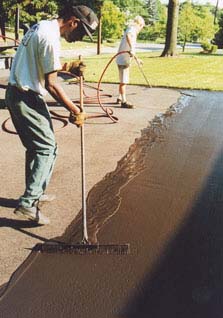Asphalt Sealers
DEAR TIM: I'm a do-it-yourselfer and would like your opinion. My blacktop driveway is 3 years old and has never been sealed. It still appears black in color. My boyfriend tells me that I can wait another few years before sealing it. I have also heard that gasoline and oil can hurt blacktop. Is this true? If so, can you recommend a treatment to prevent this damage? How often should I seal my driveway? C.O.
DEAR C. O.: Hurry! Get to the local building supply store as fast as you can. You have already waited too long! Your driveway should have been sealed at some point within its first year depending upon your geographic location.
Blacktop or asphalt paving is a very interesting surfacing material. The asphalt industry actually markets the material as a flexible pavement. This claim arises from the fact that the asphalt cement, the material that holds together the small pieces of stone and sand in the blacktop, can remain pliable for a long period of time. This quality helps the asphalt or blacktop to resist cracks if installed properly.

However, asphalt which is exposed to air and sunlight will begin to loose this flexibility. The asphalt actually begins to oxidize. Ultraviolet light (UV) from the sun also helps to breakdown the asphalt cement. This is where problems begin to happen. If the asphalt oxidizes, it becomes brittle.The bond between it and the sand and stone particles(aggregate) begins to fail. The result of this process is cracking and loosening of individuals pieces of aggregate. If you live in a climate that experiences cold weather, this process is accelerated by water which enters these cracks and then freezes.
Blacktop sealers block air and sunlight from attacking the asphalt cement. There are several different types of sealers. The traditional sealers contain the same asphalt that is used in the original blacktop. The asphalt in these sealers is often mixed with water and a soapy compound called an emulsifier. This sealer tends to have the shortest lifespan and offers little or no protection from the UV rays from the sun.
Another type of sealer contains refined coal tar. These sealers offer excellent resistance to gasoline and oil. Gasoline and motor oil can actually dissolve the asphalt cement in blacktop. The coal tar sealers also contain small clay particles and an emulsifier which enables you to apply it easily. Some refined coal tar sealers are polymer modified. These added chemicals often provide, extra UV protection, richer color, and longer life.
Would you like to have a gorgeous driveway? How about step-by-step photos and instructions that show you how I had my own tar and chip drive installed? If so, you might want my Instant Download Tar and Chip eBook.
The most expensive sealers are those that are entirely man made. They usually contain high amounts of acrylic polymers. These are the sealers you often see on tennis courts. They are available in black for driveways. These sealers offer the best overall protection and frequently can last twice as long as a conventional sealer.
You have probably seen these sealers available with sand. Sand is a beneficial ingredient. It helps to seal the pores in the blacktop, improves foot and car traction, and helps the sealer to last longer on your driveway.
One of the biggest mistakes I see homeowners make is sealing their driveways too often. It is best to wait until the previous coat of sealer has worn off before applying a new coat of sealer.This will happen at different rates on different driveways because of traffic volume and exposure to weather and sunlight.
The test for wear is really quite simple. The aggregate used in the blacktop is often some other color than black. Here in the Midwest, the small stone chips are primarily limestone, which is gray in color. When you see your blacktop beginning to gray, as my daughter constantly tells me when looking at my hair, it is time to reseal your driveway. By the way, do not use blacktop sealer as a hair colorant, it can burn your scalp.